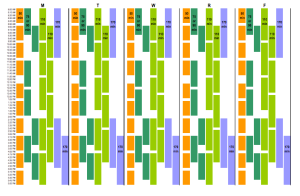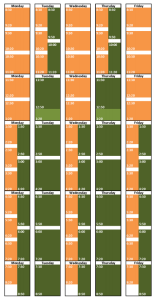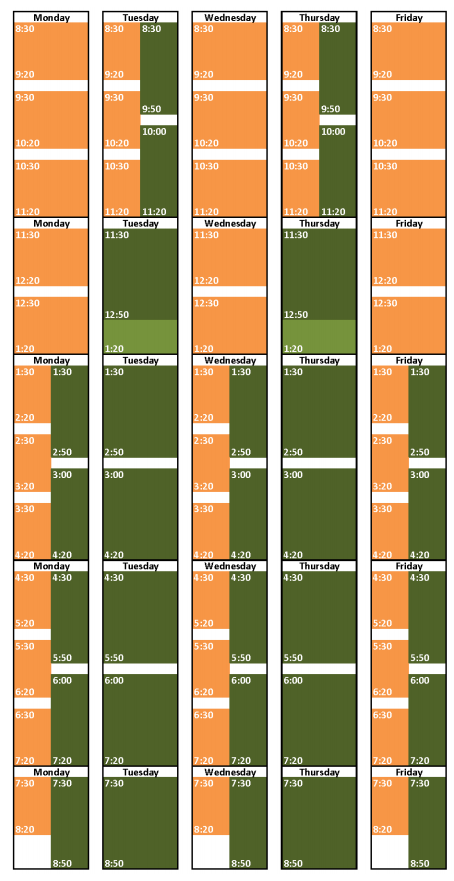A new course scheduling proposal intended to help rationalize scheduling by requiring courses to adhere to a standardized set of start times will be discussed at the Faculty Senate meeting on Thursday.
The proposal, which was sent to the Faculty Senate by Vice Provost for Undergraduate Education Harry Elam and University Registrar Tom Black, is similar to the one that the Faculty Senate discussed last January. That version was revised due to heavy student discontent and pressure last spring.
The latest scheduling proposal drops one of the most controversial requirements—banning students from double-booking classes without a waiver—but preserves another contentious issue: starting classes at 8:30 a.m.
According to the memo, the new meeting grid recommends that all classes start on the half hour from 8:30 a.m. until 7:30 p.m. Under the terms of the proposal, all classes must begin on the half hour, but ending times are more flexible to allow for courses of different lengths.
Reducing chaos
W.E. Moerner, chair of the Chemistry Department, said that the new schedule will be a wonderful improvement for students and pointed out

the complications that the current schedule causes.
“[Now], students sometimes can’t take a course because half of it overlaps with some other course,” Moerner said. “If you have a streamlined schedule, you have more choices—you can either take section A or section B, but you won’t have anything that will overlap both.”
According to the memo, there are currently 13 separate starting times for classes between 8 a.m. and 6 p.m. and 89 different meeting patterns.
“The biggest benefit [of the new proposal] is much less chaos when it comes to planning classes,” said ASSU Executive Dan Ashton ‘14. “It is a much more simplified and effective plan going down from the ridiculous messy chaos to something that is a little more structured.”

Starting early
While students have expressed support for the standardized schedule, there remain concerns about starting classes at 8:30 a.m.
At last January’s Faculty Senate meeting, Black said that one rationale for beginning the day early was opening up more periods for athletes to take classes in the morning before afternoon practices.
However, athletes noted that many teams also have morning practices or training sessions that would conflict with 8:30 a.m. classes. Zoe Wolford ‘14, a coxswain on the lightweight rowing team, said that earlier start times for classes would negatively affect her because her team practices two or three mornings per week.
“We already wake up at 5:30 a.m. for practice,” Wolford said. “If class time was earlier, there is a chance we would have to move practice back to accommodate everyone.”
Will Drinkwater ‘16, a runner on the men’s track and field team, said that he had thought a lot about the idea but concluded that moving the schedule “hurts [track athletes] more than it helps us.”
Drinkwater said that he hadn’t had trouble filling out a schedule under the current conditions, and morning practices would force his team to adjust its training schedule.
“We have practice at 7:15 in the morning, and it usually goes until 8:15 or sometimes up until 9:30 [in the morning],” Drinkwater said. “So either way, whether it’s a long practice or a short practice, it would bump right up against that 8:30 time.”
Scheduling diversity
The proposal also recommends that departments schedule at least 50 percent of their classes outside the peak period of 10:30 a.m. to 2:30 p.m. to ensure “that classes are offered at diverse times to meet student needs while ensuring that classroom space is fully utilized throughout the day.”
Last January, Black suggested to the Faculty Senate that “departments could select a handful of popular classes and put them [at the 8:30 a.m. times] and then allow them to rotate,” in order to take advantage of the new time slot. Although the possibility of moving the Program in Human Biology (HumBio) core courses to 8:30 a.m. was discussed during that meeting, Director of the Program of Human Biology Paul Fisher wrote to The Daily on Oct. 7 that “no agreement or plan to do such was made.”
The terms of the new proposal do not address which classes would be moved to the new time slot, as each department is ultimately responsible for setting its own schedule. Black was not available for comment before press time.
Language Center director Elizabeth Bernhardt said in an email statement to The Daily that language center programs were already prepared to shift their schedule for this current year.
“[A start time of] 8:30 doesn’t bother us,” Bernhardt wrote. She added that the language center currently has more than 200 sections at different times.
Moerner said that the Chemistry Department would continue offering introductory courses in both the morning and the afternoon to provide more opportunities for students.
He added that the new schedule would allow greater flexibility in scheduling lab times as the department adds two-hour lab sessions for first-year courses. He explained that because lab sessions run all day, some students may prefer the schedule to start earlier so that later lab sessions will also start earlier and don’t run into dinner.
“At one end or the other, you’re going to make someone not be the happiest,” Moerner said. “There may be some students who do like the 8:30 start, and when you give many options, you give more opportunities for some to take that and some to take others.”
Soliciting student feedback
Senator Ilya Mouzykantskii ‘16 said that the ASSU Undergraduate Senate is considering advocating for pushing the schedule down to begin at 9 a.m.
“This proposal … we like the main part of it, but we’re not sure that 8:30 is the right start time for classes,” Mouzykantskii said. “We’re not sure of the effect that that will have on the student body, and we’re really interested in feedback from students in trying to understand what their views are on the issue.”
He said ASSU representatives were particularly interested in hearing from athletes and other student leaders and populations who are concerned about the new schedule.
Both Ashton and Mouzykantskii expressed concern about the amount of sleep students would get under the new proposal, especially since many Stanford students tend to stay up late.
“There’s a concern when people are getting less sleep than the low amount of sleep that they’re already getting,” Ashton said. “Hopefully if students actually care about that, they’ll speak up when given the opportunity and we can have a voice.”
Mouzykantskii said that the Undergraduate Senate would discuss the issue on Tuesday night and potentially vote on how to represent the student body before he and Ashton make a presentation at the Faculty Senate meeting on Thursday.
“We are for the most part really happy that the registrar has rationalized the course schedule,” Mouzykantskii said. “A lot of effort has been put into this and we believe that this is fundamentally good, and the one small part that we are now concerned about is whether it is worth shifting everything up half an hour.”
Contact Jana Persky at jpersky ‘at’ stanford.edu.
Update: This article has been updated to clarify that there was and is no agreement to move the HumBio core courses to 8:30 a.m.
